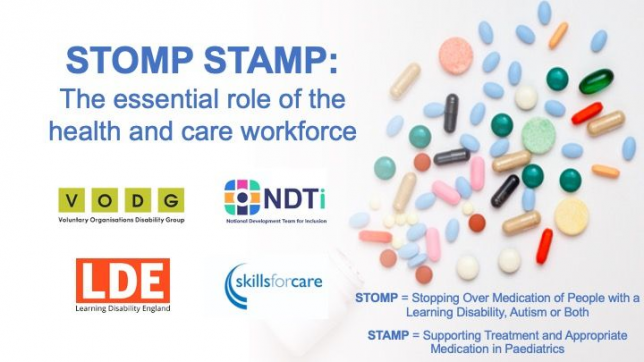The essential role of the health and care workforce in reducing reliance on psychotropic medications – ‘STOMP’ and ‘STAMP’
STOMP (Stopping Over Medication of People with a learning disability, autism or both) and STAMP (Supporting Treatment and Appropriate Medication in Paediatrics) are national projects, launched by NHS England and involving many different organisations, aiming to stop the overuse of psychotropic medicines.
It is estimated that on an average day in England between 30,000 and 35,000 people with a learning disability, autism or both are taking prescribed psychotropic medication without appropriate clinical justification.
This is a medication which results in alterations to perception, mood or consciousness. Long-term use of these medicines puts people at unnecessary risk of a wide range of side effects including weight gain, organ failure and even premature death.
We have launched a questionnaire to hear from colleagues across the health and care sector, including family carers, about your experiences of using STOMP and STAMP within your job roles and how awareness and understanding of STOMP and STAMP could be improved.
Understanding the views of health and care professionals with experience in supporting people is essential to identifying opportunities and building solutions to prevent the overuse and inappropriate use of psychotropic medications.
The questionnaire is open now until Friday 16 December 2022.
This project is a collaboration between VODG, the National Development Team for Inclusion (NDTi), Learning Disability England (LDE) and Skills for Care and is funded by Health Education England.
Find out more on our project page here: www.vodg.org.uk/resource/stomp-and-stamp-the-essential-role-of-the-health-and-care-workforce-in-reducing-the-reliance-on-psychotropic-medication.html If you have questions about the survey or would prefer to talk through your views with a researcher, please email research.policy@vodg.org.uk

